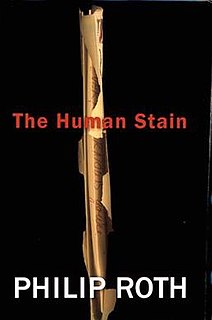
The Human Stain is a novel by Philip Roth, published May 5, 2000. The book is set in Western Massachusetts in the late 1990s. It is narrated by 65-year-old author Nathan Zuckerman, who appears in several earlier Roth novels, and who also figures in both American Pastoral (1997) and I Married a Communist (1998), two books that form a loose trilogy with The Human Stain. Zuckerman acts largely as an observer as the complex story of the protagonist, Coleman Silk, a retired professor of classics, is slowly revealed.

Leon Marcus Uris was an American author of historical fiction who wrote many bestselling books including Exodus and Trinity.
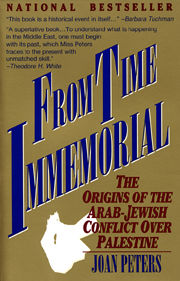
From Time Immemorial: The Origins of the Arab–Jewish Conflict over Palestine is a 1984 book by Joan Peters, published by Harper & Row, about the demographics of the Arab population of Palestine and of the Jewish population of the Arab world before and after the formation of the State of Israel.

Trinity is a novel by American author Leon Uris, published in 1976 by Doubleday. It spent 21 weeks atop The New York Times Best Sellers list in 1976 and 14 weeks in 1977.
Exodus or the Exodus may refer to:

Exodus is a historical novel by American novelist Leon Uris about the founding of the State of Israel beginning with a compressed retelling of the voyages of the 1947 immigration ship Exodus and describing the histories of the various main characters and the ties of their personal lives to the birth of the new Jewish state.
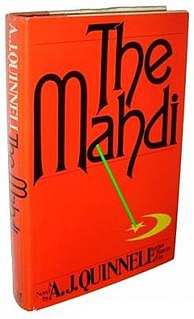
The Mahdi is a 1981 thriller novel by Philip Nicholson, writing as A. J. Quinnell. The book was published in 1981 by Macmillan in the UK then in January 1982 by William Morrow & Co in the US and deals with political power struggles over a presumed Muslim prophet.
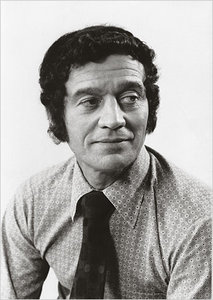
Anatole Paul Broyard was an American writer, literary critic, and editor who wrote for The New York Times. In addition to his many reviews and columns, he published short stories, essays, and two books during his lifetime. His autobiographical works, Intoxicated by My Illness (1992) and Kafka Was the Rage: A Greenwich Village Memoir (1993), were published after his death.

Icebreaker, first published in 1983, was the third novel by John Gardner featuring Ian Fleming's secret agent, James Bond. Carrying the Glidrose Publications copyright, it was first published in the United Kingdom by Jonathan Cape and is the first Bond novel to be published in the United States by Putnam, beginning a long-standing association. Part of the book takes place in Northern Europe, including Finland; to make his book as authentic as possible, Gardner even visited Finland.
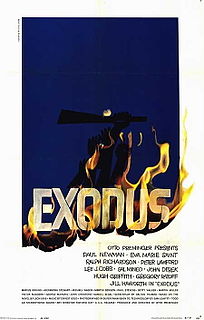
Exodus is a 1960 American epic historical drama film on the founding of the State of Israel. It was made by Alpha and Carlyle Productions and distributed by United Artists. Produced and directed by Otto Preminger, the film was based on the 1958 novel Exodus by Leon Uris. The screenplay was written by Dalton Trumbo. The film features an ensemble cast, and its celebrated soundtrack music was written by Ernest Gold.

The Little Drummer Girl is a spy novel by John le Carré, published in 1983. The title suggests a word play on the Christmas carol The Little Drummer Boy. The story follows the manipulations of Martin Kurtz, an Israeli spymaster who intends to kill Khalil – a Palestinian terrorist who is bombing Jewish-related targets in Europe, particularly Germany – and Charlie, an English actress and double agent working on behalf of the Israelis.

Yossi Klein Halevi is an American-born Israeli author and journalist.

Mitla Pass (1988) is a novel written by the American novelist Leon Uris.

Palestinian literature refers to the Arabic language novels, short stories and poems produced by Palestinians. Forming part of the broader genre of Arabic literature, contemporary Palestinian literature is often characterized by its heightened sense of irony and the exploration of existential themes and issues of identity. References to the subjects of resistance to occupation, exile, loss, and love and longing for homeland are also common.

Icon of Evil: Hitler's Mufti and the Rise of Radical Islam is a 2008 book by David G. Dalin and John F. Rothmann initially published by Random House; the 2009 version of the book by Transaction Publishers has an introduction by Alan Dershowitz. It is a biography of Haj Amin al-Husseini (1895–1974), who was the Grand Mufti of Jerusalem during the British Mandate period. Some reviewers were critical of its "overtly propagandistic" style, citing numerous factual errors and criticizing its thesis that a direct line can be drawn from the Mufti to modern-day Islamic leaders as unconvincing and lacking evidence. Other reviewers praised the book, one describing it as "the first serious biography of the mufti to appear in 14 years".

The Ethnic Cleansing of Palestine is a book authored by New Historian Ilan Pappé and published in 2006 by One World Oxford.
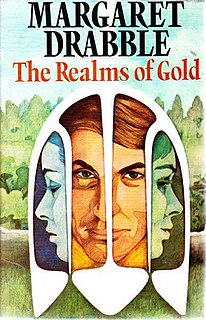
The Realms of Gold is a 1975 novel by British novelist Margaret Drabble. The novel explores the mid-life experiences of anthropologist Frances Wingate and her affair with Karel Schmidt.
The Jaffa riots of April 1936, refers to a spate of violent attacks on Jews that began on 19 April 1936 in Jaffa. A total of 14 Jews and 2 Arabs were killed during the riots.

1948: A History of the First Arab–Israeli War is a non-fiction work written by Israeli historian Benny Morris. It was published by Yale University Press in 2008. The author is otherwise known for multiple other books such as Birth of the Palestinian Refugee Problem and Righteous Victims, being a member of the group called the 'new historians' and the individual who most popularized the term.
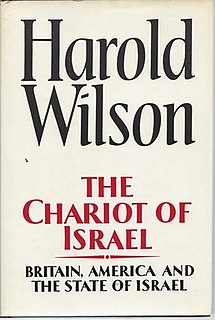
The Chariot of Israel: Britain, America and the State of Israel is a 1981 book by the British politician and former Prime Minister Harold Wilson about the relationship and foreign policy of the United Kingdom and the United States towards Israel. The book includes Wilson's personal account of his role in the Six-Day War in 1967. It received mixed reviews upon publication.

















